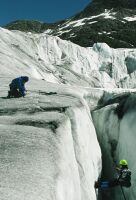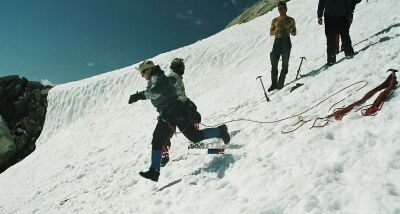|
Brekurs
Flatbrehytta, Jostedalsbreen, Norway July 2003

This summer I attended a one week course in hiking on the glacier. We were seven participants
from Norway, Denmark and Germany all eager to learn about the delights and dangers on the ice.
We learnt about the equipment both the necessary (i.e. rope) and the not-so-necessary-according-to-DNT,
for instance a helmet...
 All days were packed from morning to evening with theory in the hut and exercises on the ice.
The first day we learnt how to use our steigeisen correctly when walking uphill, downhill or sideways, and
afterwards, we were able to go further out on the ice to learn belay techniques and rescue procedures.
All days were packed from morning to evening with theory in the hut and exercises on the ice.
The first day we learnt how to use our steigeisen correctly when walking uphill, downhill or sideways, and
afterwards, we were able to go further out on the ice to learn belay techniques and rescue procedures.
After the first day of rescuing each other, we all felt more confident when moving on the ice, knowing
that if it came to the worst, we would at least be able to pull each other up from the crevasses.
The sun was shining every day on the glacier, giving us all nice white patches around the eyes, but apart
from sunburns and small cuts from the ice, the worst injury in our group happened during our belay testing.
We all had a snøanker/snowanchor for making belays in snow and we all had to try to place the anchor and test that
it would not cut its way out of the snow.
My sister tried before me, placing her anchor and testing it by fixing a rope with one end to the anchor
and the other end to her harness. Then she made to steps forward and jumped down the hill. The anchor
sat tight as expected. We had really heavy snow after almost a week of clear sunshine, so all the anchors
we tested sat tight as h...
Then it was my turn to place and test a snowanchor. I thought that I had to put a lot more weight on the anchor
than my sister had, so I ran as fast as I could down the hill, see picture below.

... the problem was that I ran till I ran out of rope, and since the rope was a static glacier rope the effect
was that my harness round my waist was suddenly held tight, stopping my run in mid-air and the rest of my body
continued straight ahead and then round for as far as I could stretch. This of course gave a tremendous weight on my waist and
the side to which I was flung around. I ended on my chest, facing the top of the hill.
 Luckily I only got what seems to be a bent rib and some sore muscles. The injury was no worse than I could complete the course, only a little careful when bending or
twisting my back. Now after five weeks, I can sleep on my side again, what a relief.
Luckily I only got what seems to be a bent rib and some sore muscles. The injury was no worse than I could complete the course, only a little careful when bending or
twisting my back. Now after five weeks, I can sleep on my side again, what a relief.
On the last day of the course we did a longer trip to Supphellenippa, where we could try out all
our new skills in hiking and navigating. When navigating on the ice, in case of bad weather, you
have to depend solely on your map and compass, using the length of the rope as a metering device
by counting every single ropelength during the walk being careful to take account of evasive maneuvres
when encountering crevasses in your path. Our taulag/group did a walk of about five kilometres, so with a ropelength
of about 16 meters we counted 310 ropelengths in the compass direction of 8 degrees before we
got to Supphellenippa. We were very proud of our accomplishment.
I would like to thank all the participants on the course for their fantastic team spirit and good moods,
for pulling me up from the crevasse and making the course a fun and memorable experience.
Links:
Fjærland
Photos brekurs 2003
Photos brekurs 2003 fra Jørn
Photos brekurs 2003 fra Ljud
The entire Photoalbum
Gjendesheim Norway 2004
Other glyn travel destinations
Use the menu at the top of the page to access the rest of www.glyn.dk
-glyn
|